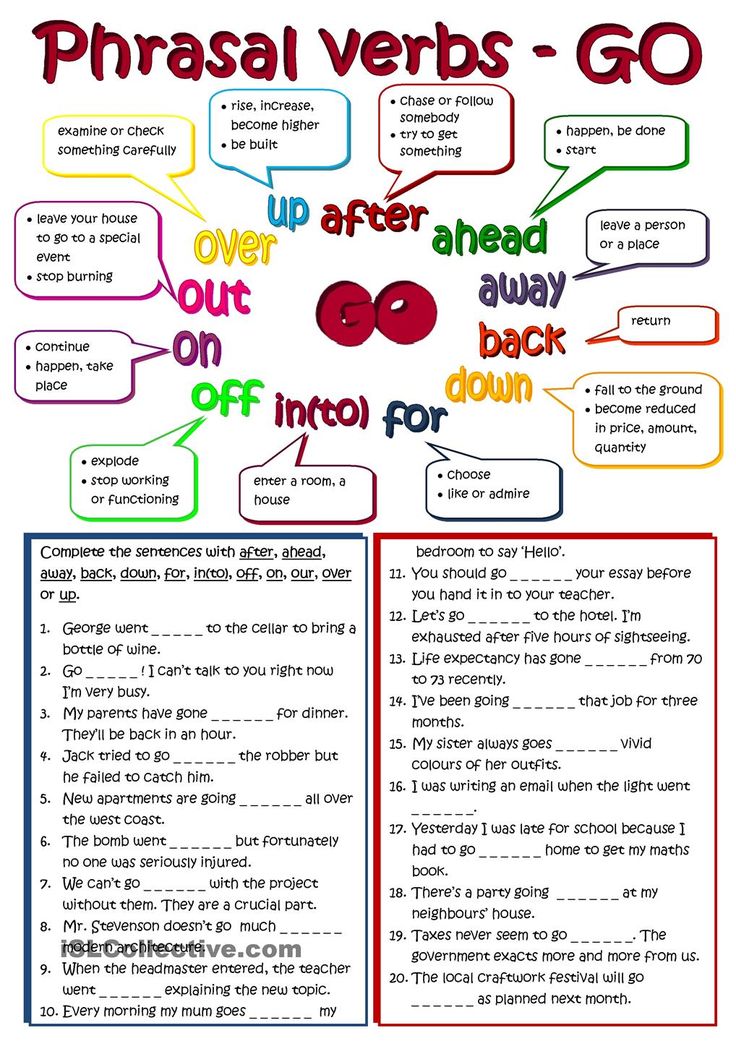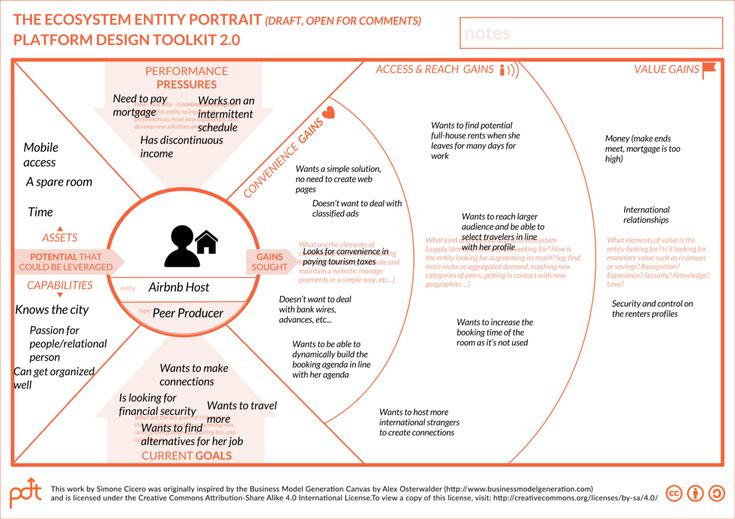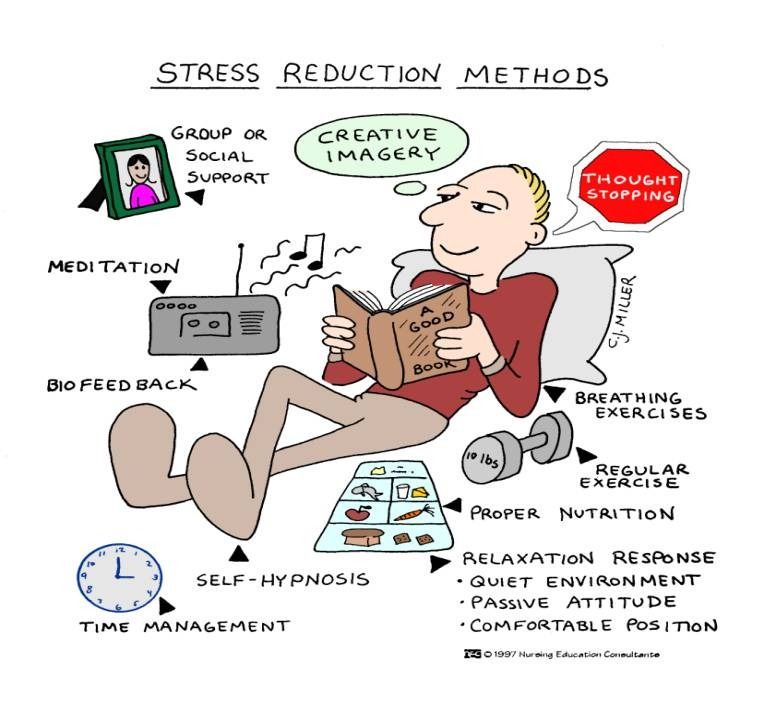Stress management 101
Stress Management 101: How to Cope Better
By Paula Derrow and Moira LawlerMedically Reviewed by Justin Laube, MD
Reviewed:
Medically Reviewed
You can’t always control when stress shows up. You can control how you respond.Oscar Wong/Getty ImagesUnless you plan to lock yourself in a room for the rest of your life, it’s impossible to exist without at least some level of stress every day, even while you’re on vacation.
And that’s okay. Stress isn’t all bad. Stress helps us avoid danger, adjust to new situations, and cope with challenges; think of it as a normal reaction that ignites certain physical and mental responses in the body, according to the Cleveland Clinic.
“When you feel stress, hormones — such as adrenaline — are released that can improve alertness and performance in the moment,” says Margie Sieka, PhD, the manager of behavioral health services at Northwestern Medicine Central DuPage Hospital in Winfield, Illinois. This response can help your body become more alert, focus better, and even work harder.
RELATED: How Stress Affects Your Body, From Your Brain to Your Digestive System
Stress becomes a problem when it becomes chronic; when instead of coping with the thing that’s stressing you out, you let all those challenging thoughts and feelings percolate. “That’s when it starts to take a toll on your emotional and physical health,” says Jennifer Haden Haythe, MD, a cardiologist, an assistant professor of medicine in the division of cardiology for the Center for Advanced Cardiac Care at Columbia, and a codirector of the Women's Center for Cardiovascular Health at NewYork-Presbyterian Columbia University Irving Medical Center in New York City.
Just as you likely can’t sprint for long periods of time without rest, your body can’t run at a heightened state of alertness, focus, and performance without rest.
Your move? Be proactive about stress management so that your stress response doesn’t outweigh the stressor you’re facing and so you'll have a set of tried-and-true techniques for dealing with whatever shows up.
How to Set Yourself Up to Deal With Stress
Regular self-care practices and behavior modifications can help keep stress from overwhelming you — and scale your stress response in proportion to the stressor.
“It’s important to understand that when it comes to stress and its impact on health, you may want to think about trying longer-term strategies and changes in lifestyle,” says Michelle Dossett, MD, PhD, MPH, an assistant professor of medicine at Harvard Medical School and an assistant physician and clinical researcher at the Benson-Henry Institute for Mind Body Medicine at Massachusetts General Hospital in Boston.
A healthy lifestyle — eating well, getting high-quality sleep, staying hydrated, and exercising regularly — can buffer you against the wear and tear of stress, says Holly Schiff, PsyD, a clinical psychologist with Jewish Family Services of Greenwich in Greenwich, Connecticut. These steps don't eliminate the challenge. But they will ensure your strongest, calmest, most rational self shows up to meet whatever obstacle you’re facing.
RELATED: The Ultimate Expert-Approved Diet Plan for a Happier, Less-Stressed You
If, for example, you got a good night’s sleep, you spent an hour doing a workout you love after waking up, and you ate a satisfying breakfast, a midmorning crisis at the office is likely going to feel a little less hair-raising than if you were feeling sleep deprived, hungry because you skipped breakfast, and burned out because you haven't made it to your favorite Pilates instructor’s class in so long.
Research indeed backs this up. One study that looked at how regular self-care practices helped medical students cope with stress during their early years of training, for example, found that those who reported more regular self-care routines also reported feeling less stressed and having a higher quality of life, according to data published in 2018 in the journal BMC Medical Education.
A study published in Frontiers in Physiology found that participants who exercised at least once per week had modest protection against the negative consequences of stress (with stress being measured by heart rate, blood pressure, cortisol, and self-reported mood).
As far as exercise goes, just make sure it’s something you enjoy. “Exercise doesn’t have to be intense, and you don’t have to join a gym,” Dr. Haythe says. “I tell my patients to buy a pair of sneakers and start walking for 15 to 20 minutes a day.”
RELATED: Why Exercise and Sleep Are Your Ultimate Defense Against Stress
What to Do When You’re Going Through a Stressful Time
Some stressors get resolved relatively quickly and go away (a travel delay, a deadline at work, a toddler’s temper tantrum, to name a few). Other stressors are ones you have to cope with for long stretches of time, such as going through a divorce or breakup, managing a difficult health diagnosis, or looking for a new job. It could even be something exciting — say if you’re preparing for an upcoming move or planning a wedding.
“Anything that puts high demands on you can be stressful — even positive things,” Dr. Schiff says. On these occasions, sticking to your usual routines can be helpful.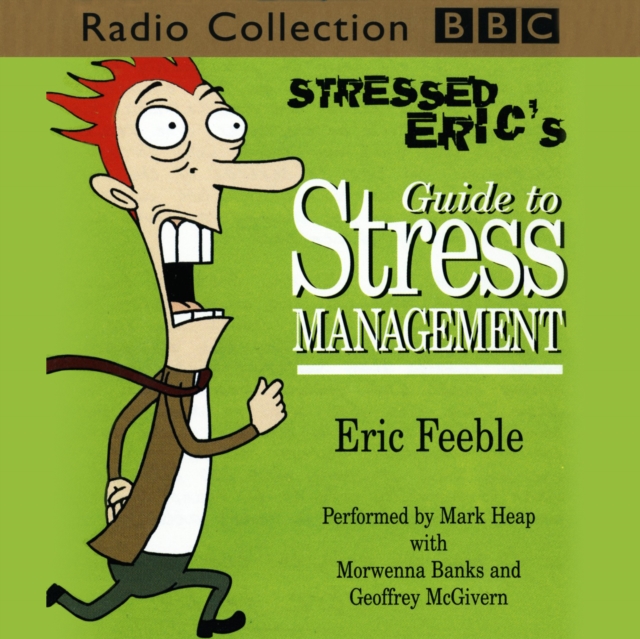
“There is some reassurance in knowing what’s going to happen and when, not to mention that routines promote positive physical and mental health,” Schiff says. “When faced with events that are scary and largely out of our control, it’s important to realize what you can control.”
It’s also important to acknowledge the extra stress you’re feeling and perhaps take your stress management up a notch.
If you’re feeling trapped and the worrying is getting in the way of your daily routine, a therapist may be able to help you find a way forward, according to Mayo Clinic.
It’s also a good idea to lean on your social circle in times like these. “Spending time with family or friends who make you feel good, or finding a community with whom you share interests or spiritual beliefs, reduces stress,” says Alka Gupta, MD, an internal medicine and integrative medicine doctor in private practice in Washington, DC.
Establishing a mindfulness practice may help.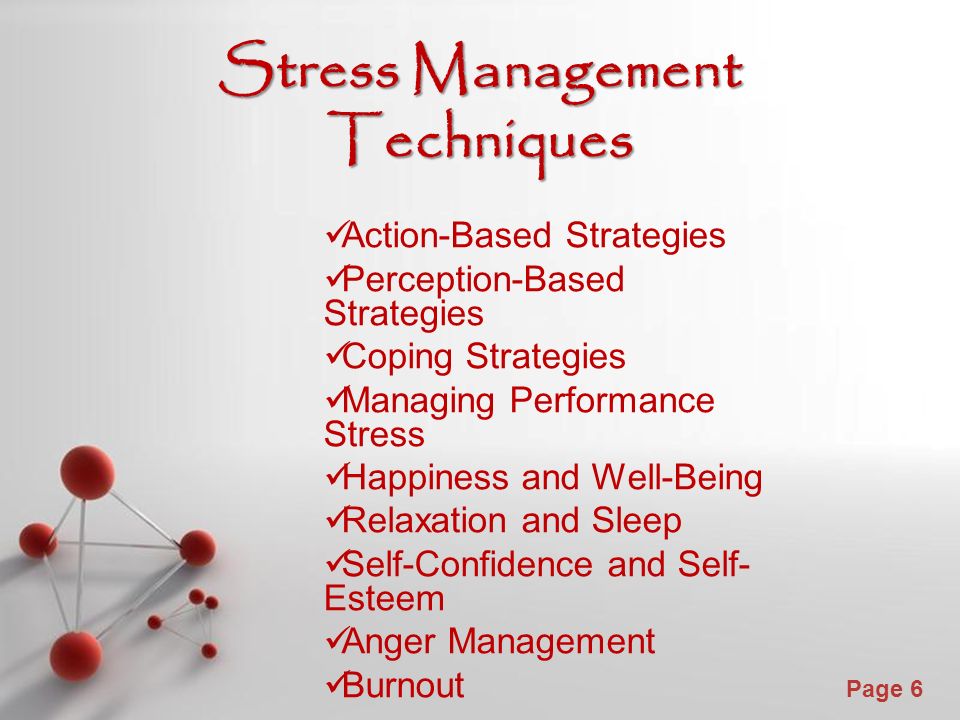 “Meditation is an important tool that can support us during those [stressful periods],” says Kelley Green, a mindfulness coach based in Brooklyn, New York. “Grounding ourselves through our breath can bring calmness and peace to our mind instead of letting the outside world take control of our emotions and feelings.”
“Meditation is an important tool that can support us during those [stressful periods],” says Kelley Green, a mindfulness coach based in Brooklyn, New York. “Grounding ourselves through our breath can bring calmness and peace to our mind instead of letting the outside world take control of our emotions and feelings.”
Numerous studies suggest, for example, that Mindfulness-Based Stress Reduction — a therapy technique based on mindfulness meditation — can help with mood issues, sleep trouble, and emotional health struggles (as well as helping with symptoms of physical health problems).
“Learning to stay in the present moment breaks the train of everyday thought that can stress you out,” Dr. Dossett says. “Whether you’re meditating, doing yoga, or taking a walk, if you pay attention to your body and your breath, you can’t be worrying about something else.”
Do keep in mind: Your stress management tools should serve you and not add to the stress.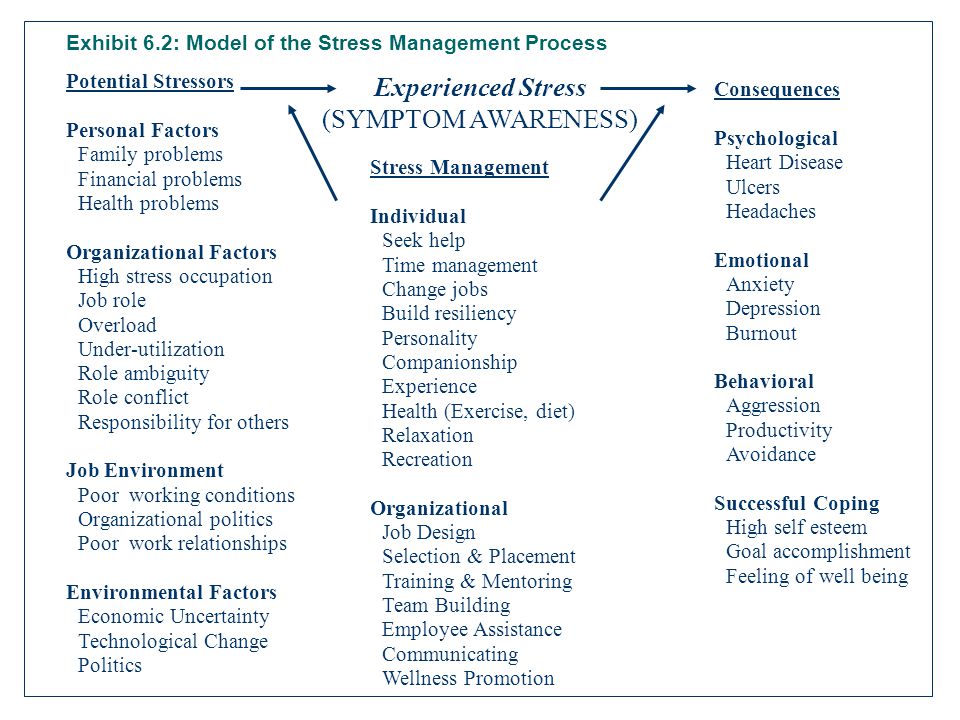 “It should feel natural and enjoyable, and should fit into your routine relatively easily,” Dr. Gupta says. That means choose stress management practices that are affordable, convenient, and that fit into your schedule.
“It should feel natural and enjoyable, and should fit into your routine relatively easily,” Dr. Gupta says. That means choose stress management practices that are affordable, convenient, and that fit into your schedule.
How to Better Cope With Stress in the Moment
Even if you do all the above, you may still enter that “fight-or-flight mode” when a stressful moment strikes (the casserole burns, your train is delayed, you’re about to give an important presentation at work). You know the feeling: Your heart starts to race and your muscles tense up.
Pay attention to these signs. “It is important to recognize the physiological signs of stress and address these symptoms in the moment to alleviate the potential harmful effects,” Dr. Sieka says.
Stress can not only lead to short-term effects like headaches or insomnia, but if it lingers it can affect your hormones, blood pressure, and relationships.
When this type of response happens, your body is prepping for survival mode (hence the physiological changes to help your body fight or flee), according to Harvard Medical School.
The goal of stress management here is to acknowledge the feeling and then dial down those physiological changes and approach the challenge rationally with your mind (unless you truly do need to flee a fire or fight a bear), explains Melissa Dowd, a licensed marriage and family therapist and the San Francisco–based therapy lead at PlushCare, a virtual health platform.
If your reaction to stress (increased blood pressure, heightened alertness, and so on) sticks around even after the trigger is gone (you catch the train, the presentation goes just fine), short-term stress can become chronic, Dowd says.
“Stress that is not handled well and continues without relief can lead to chronic stress and contribute to physical concerns, such as headaches, gastrointestinal issues, and high blood pressure, and mental health problems, such as irritability, depression, anxiety, and substance use,” Sieka says.
Dowd says some people are more prone to chronic stress. “This can be due to genetics, life experiences, and unhealthy coping mechanisms,” she says.
It’s good to have a few tricks up your sleeve that can help you de-escalate stressful situations quickly, such as squeezing a stress ball, distracting yourself with fidget spinners, cueing up a mindfulness app, and trying deep-breathing exercises.
The point of these in-the-moment quick fixes is that they help turn off the body’s fight-or-flight stress response, so that you can more calmly cope with the challenge at hand and so that stress doesn’t become chronic, Dowd says.
If you find yourself frequently feeling that fight-or-flight response, or it's difficult to manage, consider seeking help from a mental health provider (or asking your doctor if you don’t have one). Difficult-to-manage stress can be a sign of past trauma, and may need trauma-informed care.
RELATED: How to Bust Stress in 5 Minutes or Less
Editorial Sources and Fact-Checking
- Stress. Cleveland Clinic.
 January 28, 2021.
January 28, 2021. - Stress Relievers: Tips to Tame Stress. Mayo Clinic. March 18, 2021.
- Hoge EA, Bui E, Palitz SA, et al. The Effect of Mindfulness Meditation Training on Biological Acute Stress Responses in Generalized Anxiety Disorder. Psychiatry Research . April 2018.
- 5 Ways to Reduce Stress Right Now. Queensland Health. October 8, 2020.
- Understanding the Stress Response. Harvard Medical School. July 6, 2020.
- Ayala EE, Winseman JS, Johnsen RD, Mason HRC. U.S. Medical Students Who Engage in Self-Care Report Less Stress and Higher Quality of Life. BMC Medical Education. August 6, 2018.
- Childs E, de Wit H. Regular Exercise Is Associated With Emotional Resilience to Acute Stress in Healthy Adults. Frontiers in Physiology. May 1, 2014.
- Center for Mindfulness: FAQs. University of Massachusetts Medical School.
- Menschner C, Maul A. Key Ingredients for Successful Trauma-Informed Care Implementation.
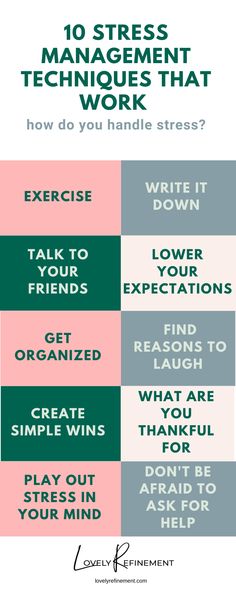 Center for Health Care Strategies. April 2016.
Center for Health Care Strategies. April 2016.
Show Less
By subscribing you agree to the Terms of Use and Privacy Policy.
The Latest in Stress
Everything You Ever Wanted to Know About Stress and How to Manage It
By Paula DerrowHow Stress Affects Your Body
It’s one thing to feel occasional stress, but constant pressure increases your risk of developing serious illness. Here’s what you need to know about ...
By Paula Derrow
Nikita Gupta, MPH: Q&A on Stress
By Everyday Health EditorsStephen W. Porges, PhD: Q&A on Stress
By Margot Slade9 Ways Stress Can Make You Sick
Stress has been linked to cardiovascular disease, depression, and even the common cold.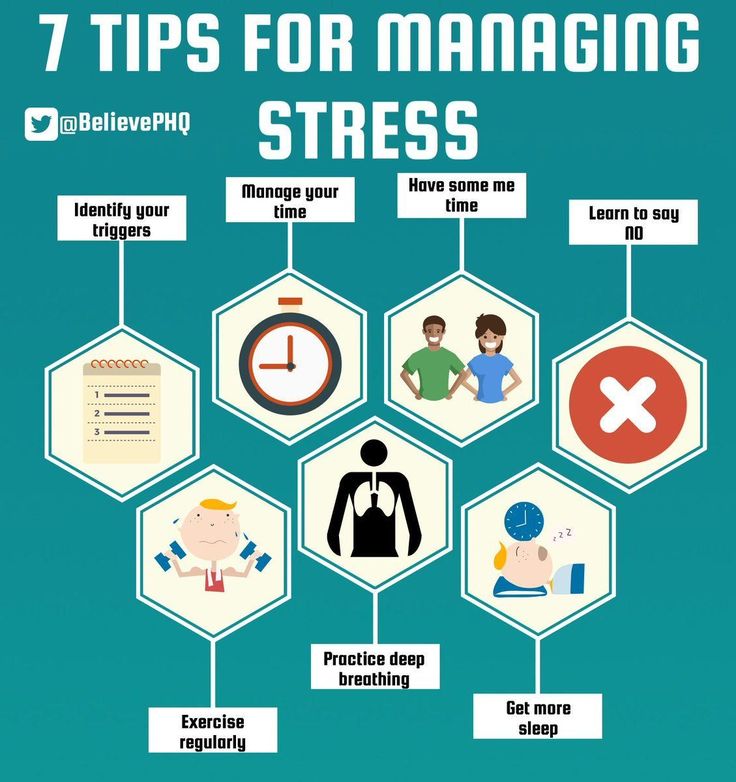
By Jenny Splitter
Stress Management 101 | HealthyPsych.com
This post provides a scientific overview of the the stress response and practical ways to lower it, synthesizing material from several experts in stress management and positive psychology, including Dr. Fred Luskin, Dr. Kenneth Pelletier (Source: Stress Free for Good), and Tal Ben-Shahar, (PBS talk “Happiness 101“).
Sections in this article:
What is Stress
Fight-Flight-Freeze Response
How Stress Hurts Us
10 Ways to Reduce Stress
What is Stress?
In order to get a better handle on stress management, one first must define the concept of “stress.” Stress comes in many shapes and sizes. It can manifest as sleepless nights, chronic fatigue, low grade tension in the body, and foggy thinking. At its most extreme, it can contribute to serious psychological and physical illness, like heart disease, diabetes and major depression.
But, what exactly is this thing we call “stress?” Hans Selye, MD, a pioneer in the study of stress, defined it as “the nonspecific (that is, common) result of any demand upon the body, be the effect mental or somatic” (Goldberger and Breznitz, 1993).
Neuroendocrinologist and Stanford University professor Robert Sapolsky writes that “a stressor is anything in the outside world that knocks you out of homeostatic balance.”
As you can see, the “stress” concept is a fairly subjective one. What may be seen as “stressful” to one person, can be experienced as benign by another. Thoughts, beliefs, and mitigating factors, like social support and socio-economic status help answer the question, “What is it that makes psychological stress stressful”? (Sapolsky, 2013).
Two giants in the field of stress research, former UC Berkeley psychology professor Richard Folkman and Susan Lazarus, professor of integrative medicine at UCSF (1991), note that “cognitive appraisal” – how we perceive and interpret a situation – is a critical element in the stress and coping response.
In their analysis, Lazarus and Folkman identify two stages in this cognitive appraisal process. First, a determination is made about what’s at stake in the matter (i.e., how significant is the stressor, what kind of impact will it have on my life, etc.). Then, we assess what can be done about it (i.e., do I have the tools to solve this problem or not? Is this something within my control?). If something is seen as a serious threat to our well-being, and as uncontrollable (i.e., that we don’t have the resources to handle the problem), then it will feel more stressful. Alternatively, if we view the situation as a “challenge,” rather than a “threat,” and we can identify tools to help us cope or solve the problem, then the event will (likely) be experienced as less stressful. Thus, interpretation – how we view a problem – is an important variable in the stress response.
In modern times, many people see stress as something to be avoided. But, the day to day stress we all face that involves getting up in the morning, brushing our teeth and taking care of our daily responsibilities is a simple fact of life.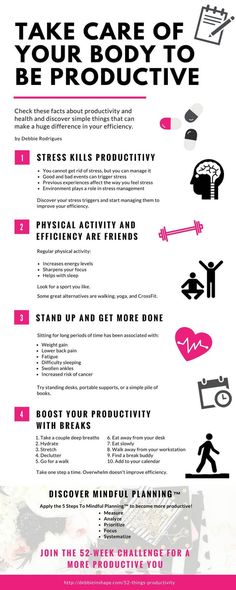 A moderate amount of stress isn’t actually a bad thing (and it’s often simply known as stimulation). However, excessive and unrelenting stress – the kind that results in physical or psychological damage – is something we should all be minimizing.
A moderate amount of stress isn’t actually a bad thing (and it’s often simply known as stimulation). However, excessive and unrelenting stress – the kind that results in physical or psychological damage – is something we should all be minimizing.
Later in this article, we’ll explore practical ways to lower stress, including cognitive strategies that can impact how we relate to difficult circumstances. But first, let’s take a more in-depth look at exactly how stress is harmful.
Fight-Flight-Freeze Stress Response
When exposed to a threat, a complex alarm system gets triggered in the body, that includes the release of stress hormones like adrenaline and cortisol. This state of high-alert is often referred to as the “fight or flight” response, a term first coined in 1915 by former Harvard Medical School professor Walter Cannon. More recently, this model been broadened to include the concept of “freezing,” especially when it pertains to traumatic experiences.
In the face of a “serious threat” – however that may be defined by the individual – we as humans, like all vertebrates, are wired to respond in one of these three ways.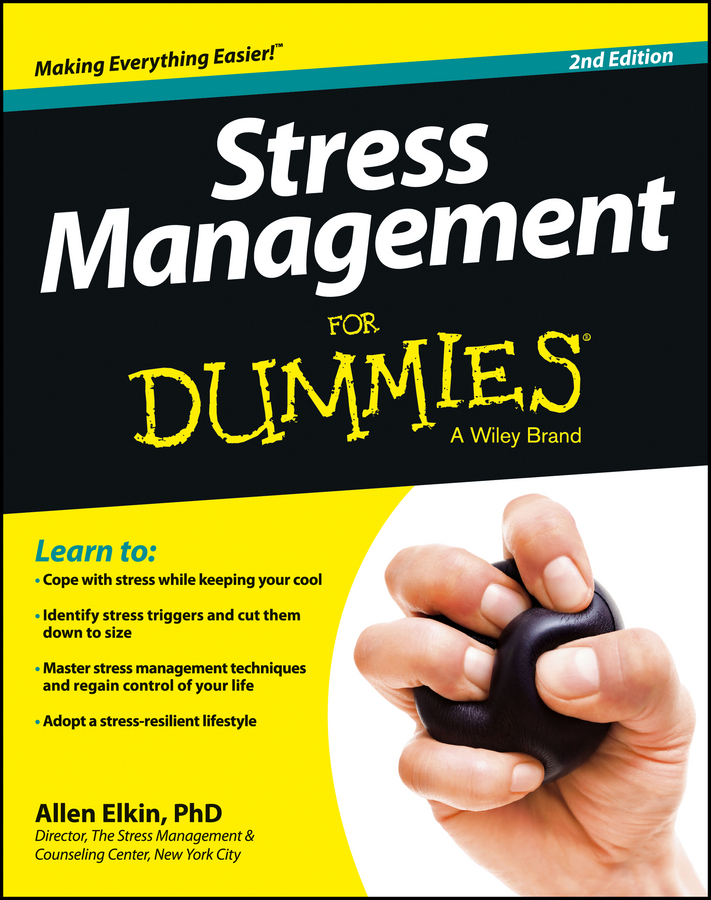 “Fighting” involves getting angry, gearing up for a confrontation and then doing everything in our power to protect ourselves. “Fleeing” is when we run away from or avoid whatever we perceive as threatening. “Freezing” is when we’re stuck, uncertain of how to proceed, and can also include a feeling of being on guard or hypervigilant.
“Fighting” involves getting angry, gearing up for a confrontation and then doing everything in our power to protect ourselves. “Fleeing” is when we run away from or avoid whatever we perceive as threatening. “Freezing” is when we’re stuck, uncertain of how to proceed, and can also include a feeling of being on guard or hypervigilant.
These ancient and reflexive responses are particularly helpful when, say, you’re alone in the jungle and a hungry lion is chasing you. However, in modern times, most of us don’t face this particular type of challenge. Unfortunately, however, our bodies can still get triggered in the same manner to psychological stressors, whether the “threat” is real or imagined. When our spouse gets upset at us or if we’re running late to an important meeting, our central nervous system can respond as if we’re facing a dangerous situation, depending on how we relate to those experiences (note: sometimes anger can be highly triggering if there’s a threat of violence, but often anger or disappointment from another gets filtered through a lens that makes it seem more threatening than it is).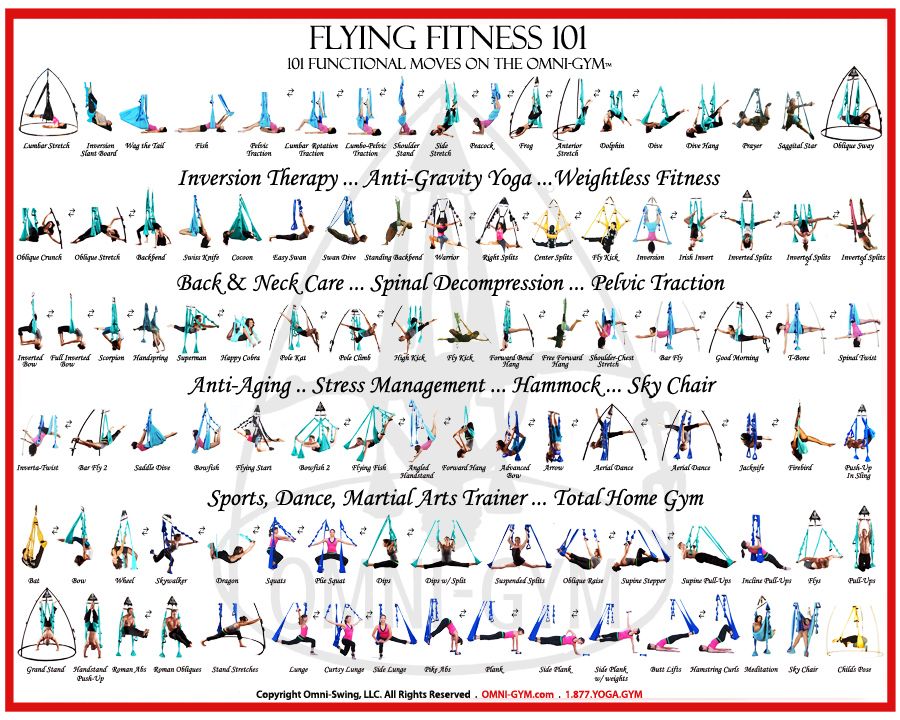
How Stress Hurts Us
Low levels of stress and periodic periods of higher stress aren’t that bad for us. However, if our nervous system is constantly on high-alert, this will eventually take a toll on our body and mind.
As stress management experts Dr. Fred Luskin and Dr. Kenneth Pelletier (2005) discuss in Stress Free for Good, the fight-flight-freeze stress response results in the following:
1.) Increased heart rate to pump more blood to your muscles, resulting in higher blood pressure
2.) Faster breathing to give you more oxygen
3.) Muscular tensing in preparation for action
4.) Reduced blood flow to the prefrontal cortex of the brain (which impacts executive functioning and reasoning ability)
5.) Increased blood flow to the limbic region of the brain (the highly reactive area that mediates emotion)
6.) Cessation of digestion process to divert blood flow to brain and muscles, which can result in abdominal discomfort and even irritable bowel syndrome
7.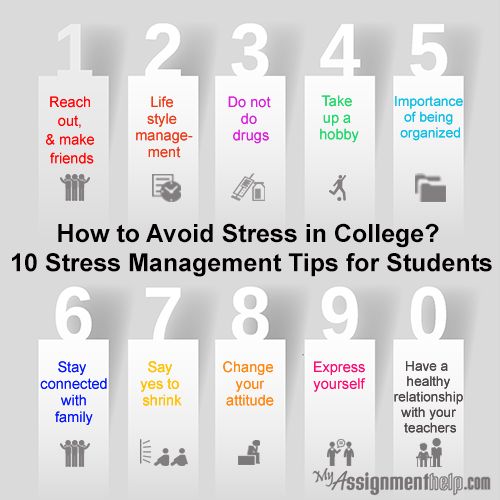 ) Increased sweat to cool off and “become lighter in preparation for a potential confrontation”
) Increased sweat to cool off and “become lighter in preparation for a potential confrontation”
8.) Pupil dilation, increased sense of hearing and smell to enhance performance in the face of the threat
9.) Increased inflammation in the arteries around your heart
10.) Decreased immune function
11.) Narrowing of focus on the immediate danger to maximize survival, resulting in decreased ability to identify other possible solutions
From reading this list, it’s clear that being in “fight-fight-freeze” mode on a frequent basis isn’t a good thing. Numerous studies abound demonstrating the link between chronic stress (which includes overexposure to stress hormones) and increased risk heart disease, digestive problems, sleep difficulties, obesity, depression, diabetes, reproductive disorders and memory problems.
In addition, there’s considerable research indicating a relationship between stress and tumor development in animals (Stein and Miller, 1993). Although such findings in humans are more controversial, there is a link between stress induced behaviors, like smoking or excessive alcohol use, and an increased risk of cancer.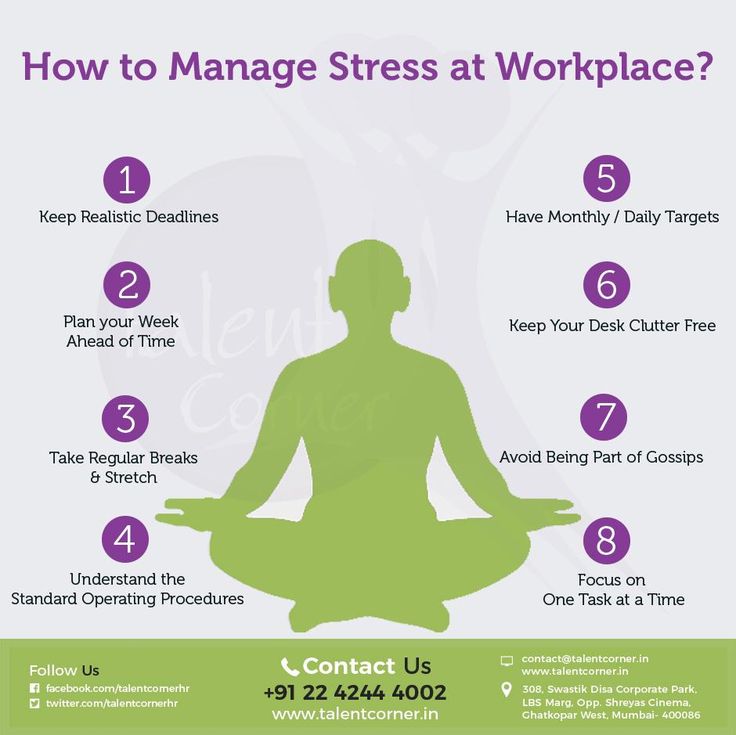
10 Stress Management Tactics
So, the bad news about chronic stress is clear. But, the good news is that there are many scientifically supported strategies that can help us manage and reduce stress. As stress management expert Robert Sapolsky, PhD. has noted, it’s important to be practical and experiment with different techniques to see what works best for you; what may be relaxing for one person, can actually be stress inducing to another. For most people, getting into a routine – practicing stress management techniques on a regular basis – will be most beneficial. With some of these stress management strategies, you’ll find instant relief, where you feel better right away; with others, you need to give them ample time to determine the overall benefit to your individual physiology.
1.) Exercise: regular exercise is one of the best things we can do to combat stress. Exercise increases the production of endorphins, the body’s natural opiate-like chemicals that make us feel good.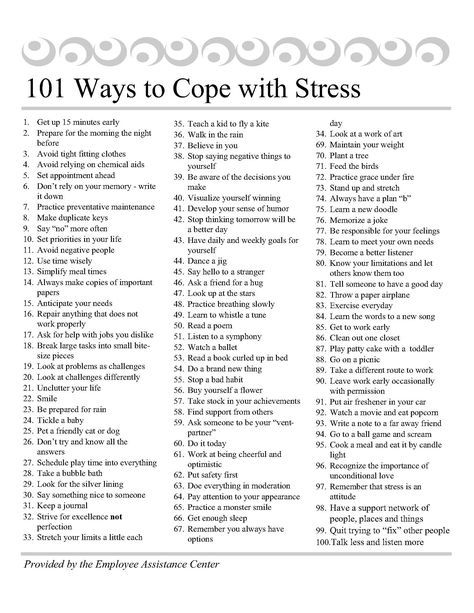 It also reduces blood levels of the stress hormone cortisol. In addition, it can help clear the mind of thought patterns related to worry and anger that may be contributing to stress. Exercise is so powerful that Duke University researchers found that walking a mere 30 minutes per day was as effective as medication for treating depression.
It also reduces blood levels of the stress hormone cortisol. In addition, it can help clear the mind of thought patterns related to worry and anger that may be contributing to stress. Exercise is so powerful that Duke University researchers found that walking a mere 30 minutes per day was as effective as medication for treating depression.
2.) Belly Breathing: also known as diaphragmatic or deep breathing, this is a simple, yet powerful tool for stress management (Luskin and Pelletier, 2005). How do you do it? Start by placing one hand on your stomach, then slowly inhale, filling your belly with air, as if you’re inflating a balloon. Try to fill your stomach area with a deep breath, rather than expanding your chest area as you inhale. You can count to 3 on the inhale. Then, slowly exhale. Feel the rise and fall of your belly as you do this. You can practice this for a total of 20-30 seconds at random intervals throughout the day or use this as a tool before stressful interactions.
When we’re highly-stressed, in fight-flight-freeze mode, breathing is shallow and quick (a sign that the sympathetic nervous system is doing its job). Taking slow, deep breaths from the belly engages the parasympathetic nervous system – the part of the nervous system responsible for relaxing our bodies and minds. When we do this, we essentially send a message to our brains that we’re no longer in danger, which allows us to settle down and feel more at ease.
3.) Slow Down and Simplify: trying to cram too much into one day or taking on more responsibilities than we can handle is a recipe for high stress and burnout. While our culture values multitasking, busyness and speed, our bodies and minds do not. On a side note, an interesting study out of the UK shows that multitasking actually makes us less efficient, by lowering IQ (fortunately, this lowering is only temporary!).
Learn to delegate, ask for help and say “no” more. This is especially important for women who are conditioned to be the caretakers of the world, often at their own expense. Look at your schedule and distinguish between “needs” and “wants.” Choose to keep doing the things you absolutely “need” to and let go of some of the “wants” that are more optional. Slowing down helps lower blood pressure and increases one’s sense of enjoyment by living more in the moment (Luskin and Pelletier, 2005)
Look at your schedule and distinguish between “needs” and “wants.” Choose to keep doing the things you absolutely “need” to and let go of some of the “wants” that are more optional. Slowing down helps lower blood pressure and increases one’s sense of enjoyment by living more in the moment (Luskin and Pelletier, 2005)
Tal Ben-Shahar, professor and author of the bestseller Happier, taught the most popular course in the history of Harvard entitled “Positive Psychology” (the course popularity shows how much people are craving tools to help increase happiness and manage stress). One of the things he emphasizes, when it comes to stress management, is the the importance of taking regular breaks, which can be classified into 3 types:
- Micro (e.g., taking a 15 minute break after every 2 hours of work)
- Mezzo (e.g., taking 1 day off per week)
- Macro (e.g., taking vacations each year)
Research shows that taking these types of breaks on a regular basis is correlated with increased happiness, better productivity and more creative thinking.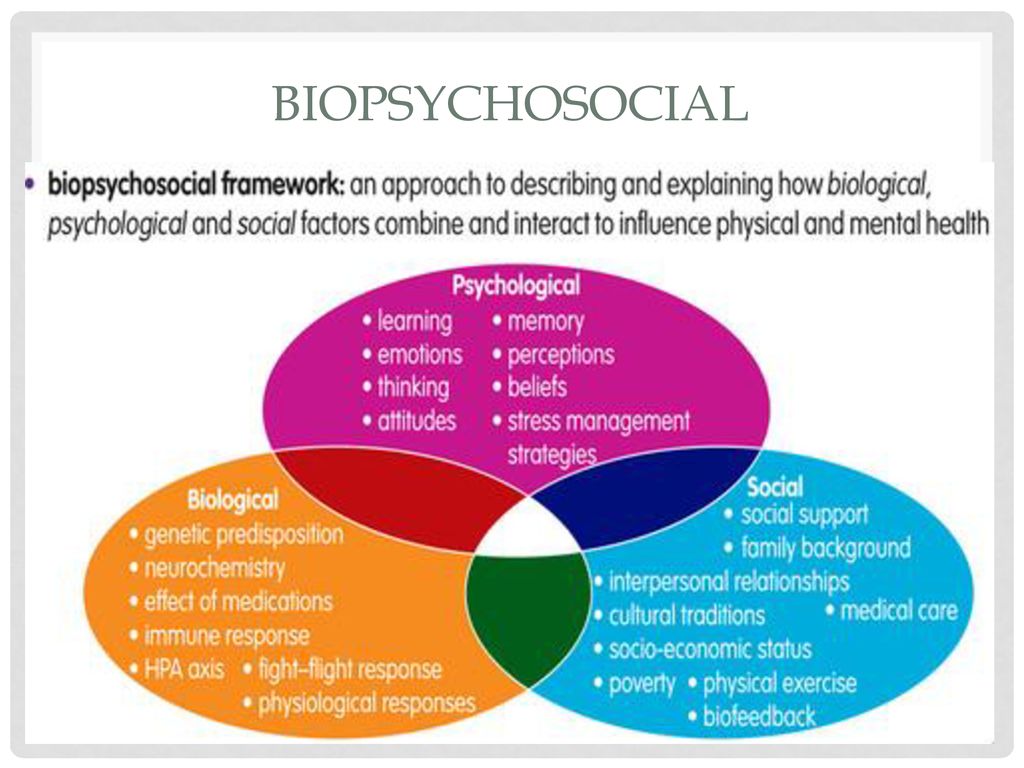 Obviously, not everybody has the luxury of taking regular breaks and time off from work, but do the best you can. At a minimum, look at taking breaks, even if they’re small, as incredibly valuable to your physical and psychological health. And, be mindful of what you do on your break: choose things that are restful and rejuvenating, rather than overly stimulating or draining. For example, if you work on a computer all day, taking a break by surfing the web is probably not going to be as refreshing as taking a walk or nap.
Obviously, not everybody has the luxury of taking regular breaks and time off from work, but do the best you can. At a minimum, look at taking breaks, even if they’re small, as incredibly valuable to your physical and psychological health. And, be mindful of what you do on your break: choose things that are restful and rejuvenating, rather than overly stimulating or draining. For example, if you work on a computer all day, taking a break by surfing the web is probably not going to be as refreshing as taking a walk or nap.
4.) Mindfulness Practices: mindfulness meditation is an ancient spiritual practice that involves paying attention to the present moment, with a sense of non-judgment and acceptance for whatever arises. Mindfulness can be cultivated through a variety of practices, including mindful breathing, eating, walking and really, just about any activity.
Mindfulness-Based Stress Reduction (MBSR) is a popular program developed by Jon Kabat-Zinn, PhD.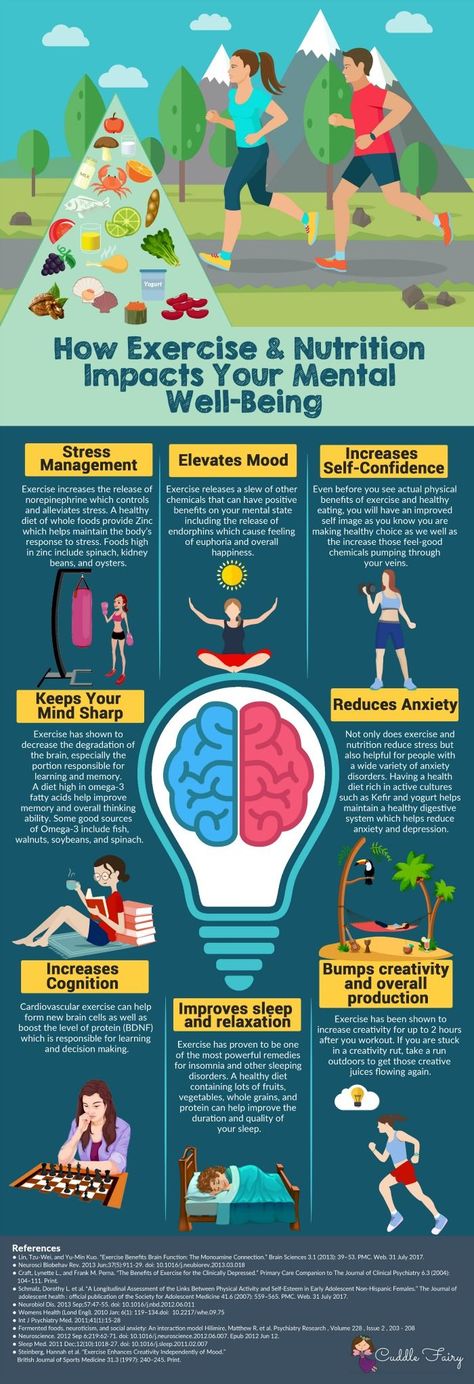 , Professor of Medicine at UMass Medical School, that includes mindfulness meditation, yoga, group discussions, and other exercises designed to develop one’s awareness. Studies suggest that MBSR offers many benefits, including lowered stress levels and a reduction in medical symptoms (Williams, Kolar, Reger, and Pearson, 2001), lowered anxiety and improved immune function (Davidson, 2003).
, Professor of Medicine at UMass Medical School, that includes mindfulness meditation, yoga, group discussions, and other exercises designed to develop one’s awareness. Studies suggest that MBSR offers many benefits, including lowered stress levels and a reduction in medical symptoms (Williams, Kolar, Reger, and Pearson, 2001), lowered anxiety and improved immune function (Davidson, 2003).
Mindfulness helps us live in the present moment more. When we’re in a highly stressed state, we’re often worried about the future or fixating on something that happened in the past. Next time you find yourself feeling stressed out, ask yourself how you feel about the present moment. You’ll often find that you actually feel OK, that it’s the future or past you’re concerned about. You can rest easy in this awareness of the “OK” quality of the present. This is relaxing and can free up the mind for engaging in more effective problem-solving, when necessary.
To learn more about mindfulness, read: What is Mindfulness?
5.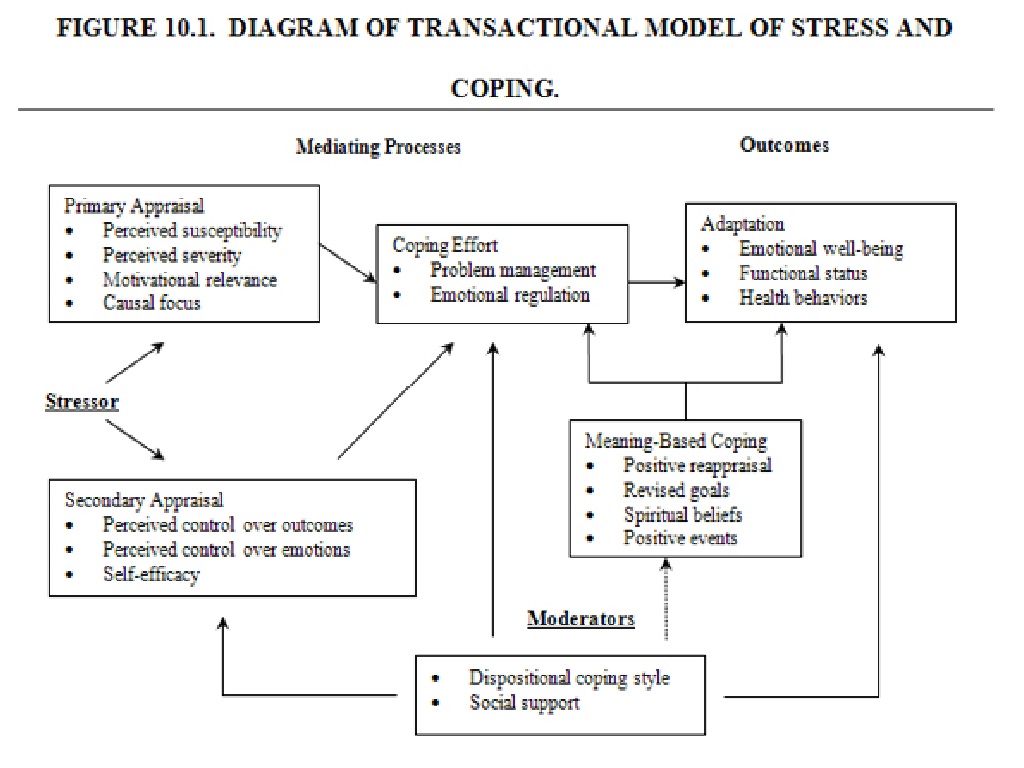 ) Play: Just like kids, adults need ample time to “play” in order to feel happy and balanced on both a physical and emotional level.
) Play: Just like kids, adults need ample time to “play” in order to feel happy and balanced on both a physical and emotional level.
The National Institute of Play, founded by Stuart Brown, MD, notes that “play is the gateway to vitality…it generates optimism, seeks out novelty, makes perseverance fun, leads to mastery, gives the immune system a bounce, fosters empathy and promotes a sense of belonging and community…The prevalence of depression, stress related diseases, interpersonal violence, the addictions, and other health and well being problems can be linked, like a deficiency disease, to the prolonged deprivation of play.”
Play covers a wide range of activities, including sports, music, arts and crafts, gardening and simply hanging out with friends and laughing. Researchers have categorized play into seven types known as: attunement play; body play and movement; object play; social play; imaginative and pretend play; storytelling-narrative play; transformative and creative play. Click here to learn more about this fascinating research on the science of play.
Click here to learn more about this fascinating research on the science of play.
6.) Cognitive Restructuring: is a fancy term associated with cognitive-behavioral therapy (CBT), one of the most widely studied and efficacious forms of psychotherapy, that refers to the process of changing your thoughts to more rational and self-supportive ones. The underlying assumption in CBT is that it’s not our circumstances per se that cause emotional suffering, but it’s how we interpret those situations. We always have a choice in terms of how we view something and how we talk to ourselves about it. We’re more likely to experience negative emotions and behaviors if we’re faced with a difficult situation and we say to ourselves, “I can’t handle this.” Alternatively, if we stop, take a deep breath and say, “I may not have the solution to this problem right now, but I’m determined to find a way,” we’re likely to feel less overwhelmed and be in a better position to take effective action.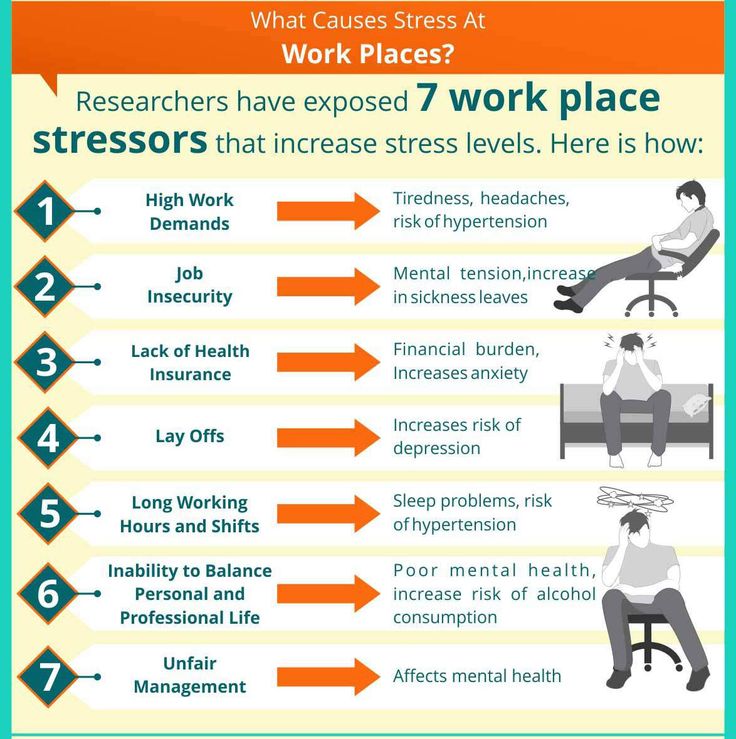
Research shows that having a “sense of control” is a key component of emotional well-being. When under stress, identifying ways to take action and thinking about the situation from different angles can instill a sense of control. On the other hand, sometimes life presents circumstances which are beyond our control, that we can’t “do” anything about. In these situations, it can be helpful to have an attitude of acceptance.
Tara Brach, psychologist and bestselling author of Radical Acceptance: Embracing Your Life with the Heart of a Buddha, recommends the practice of “saying yes” to experiences, no matter how unpleasant. As she notes, an attitude of resistance, or “saying no” to experiences actually increases tension. The point here isn’t to condone things that are harmful, like violence or substance abuse; it’s about maintaining an attitude of acceptance in the moment when difficulties arise, by essentially saying, “Ok, this is what I have to deal with right now. I don’t like it, but it’s my present reality.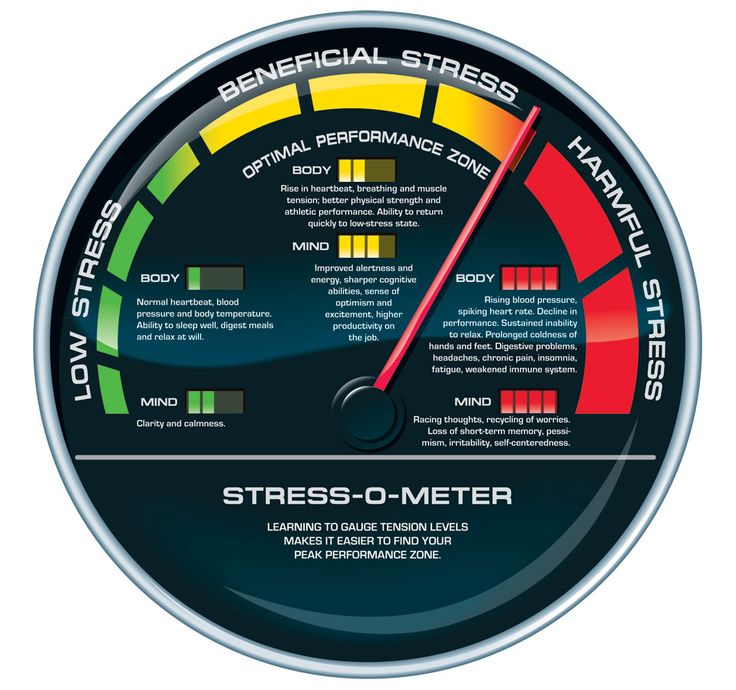 ”
”
7.) Be Grateful: similar to cognitive restructuring, choosing to focus on things you appreciate can have a significant impact on your mood and stress level. As Luskin and Pelletier note (2005, p.80), “appreciation takes advantage of our parasympathetic nervous system to reduce the stress response and trigger our optimal performance zone. Looking for things to appreciate reduces stress and actually retrains our nervous system to make it easier to relax.”
There’s research out of UC Davis that supports the powerful benefits of gratitude/appreciation practices. For example, writing in a weekly gratitude journal was correlated with:
- Greater emotional and physical well-being
- Higher levels of optimism
- More effectiveness in one’s life with regards to goal attainment
The UC Davis Emmons Lab notes that “Grateful people report higher levels of positive emotions, life satisfaction, vitality, optimism and lower levels of depression and stress.![]() The disposition toward gratitude appears to enhance pleasant feeling states more than it diminishes unpleasant emotions. Grateful people do not deny or ignore the negative aspects of life.”
The disposition toward gratitude appears to enhance pleasant feeling states more than it diminishes unpleasant emotions. Grateful people do not deny or ignore the negative aspects of life.”
Try this practice by writing down 3 or saying aloud to another 3 things you’re grateful for each day. Notice how this makes you feel in the moment and after doing for a week or two. This simple practice can actual feel quite transformative.
8.) Connect Socially: according to U-Chicago psychology professor John Cacioppo, “loneliness leads to higher rises in morning levels of the stress hormone cortisol, altered gene expression in immune cells, poorer immune function, higher blood pressure and an increased level of depression.”
Human beings are social creatures. In addition to food, water and shelter, we all need a certain amount of social contact to survive and feel a sense of community and belonging. Some need more social contact, while others need less. Dealing with life’s demands in isolation can be very draining and stressful.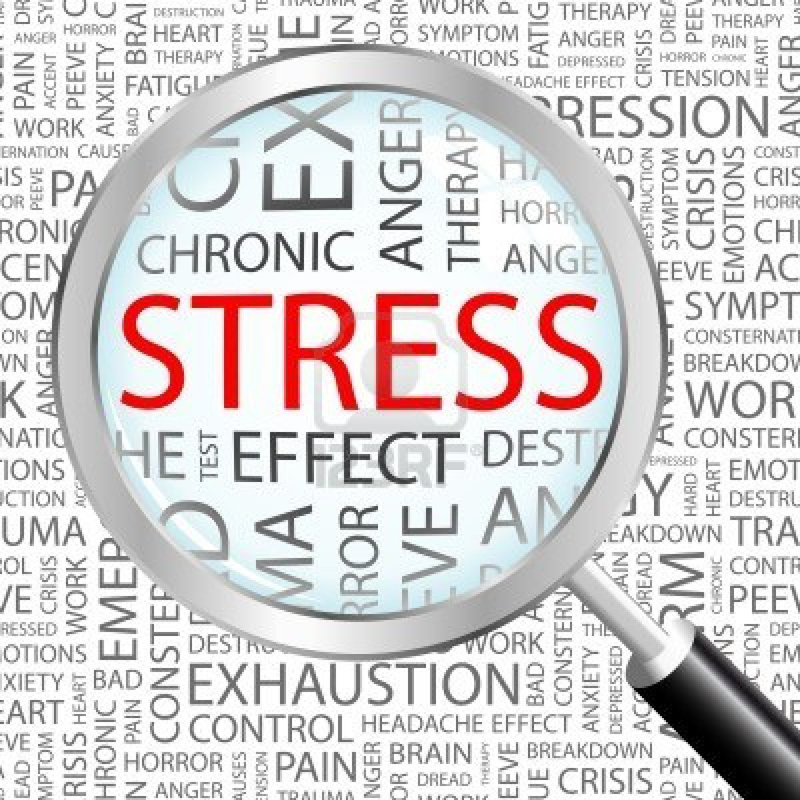 In addition, negative emotional states tend to be maintained or exacerbated in isolation. Therefore, it’s important to maintain positive relationships. Emphasis is on the ‘positive’ here, as unhealthy relationships obviously increase stress levels, so they’re best to be avoided.
In addition, negative emotional states tend to be maintained or exacerbated in isolation. Therefore, it’s important to maintain positive relationships. Emphasis is on the ‘positive’ here, as unhealthy relationships obviously increase stress levels, so they’re best to be avoided.
In the article “Awakening from the Trance of Unworthiness,” psychologist Tara Brach writes that “our most fundamental sense of well-being is derived from the conscious experience of belonging.” This excellent article discusses the importance of connection from a spiritual perspective and is well-worth reading.
9.) General Self-Care: while basic self-care may sound like an obvious component of stress management, it’s easily neglected when we’re leading busy lives. Good nutrition that includes plenty of fruits and vegetables, along with limited consumption of sugar, caffeine, alcohol and other toxic substances, contributes to more balanced mood states and energy levels.
Getting an adequate amount of sleep each night is also critical for our physical, emotional and cognitive well-being.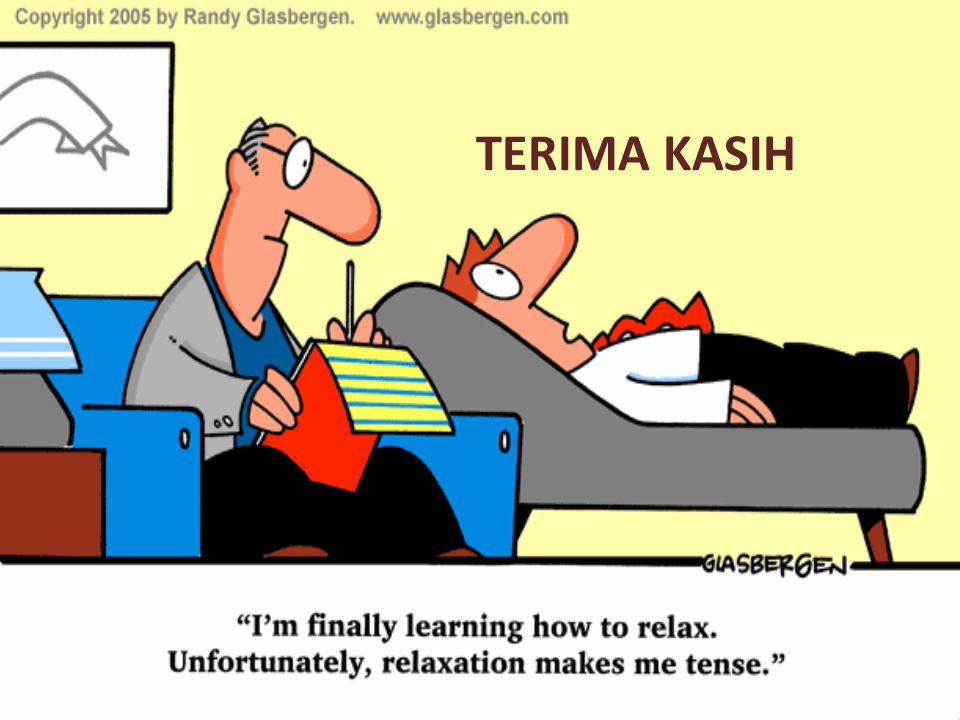 Make getting a good night’s sleep a basic part of your stress management routine. When we’re rested, we have the mental and physical energy to better meet life’s demands. Besides the obvious benefits of this, thinking more clearly about ways to solve problems also increases our sense of control – a mitigating factor in the stress response. Most adults need between 7-9 hours of sleep to feel recharged. It’s important to pay attention to how much sleep you need in particular, as each person’s body is different.
Make getting a good night’s sleep a basic part of your stress management routine. When we’re rested, we have the mental and physical energy to better meet life’s demands. Besides the obvious benefits of this, thinking more clearly about ways to solve problems also increases our sense of control – a mitigating factor in the stress response. Most adults need between 7-9 hours of sleep to feel recharged. It’s important to pay attention to how much sleep you need in particular, as each person’s body is different.
Also, let your reading of this information be a reminder to take care of any outstanding healthcare needs, such as medical appointments that you’ve been putting off. In addition to directly addressing your health needs, checking these appointments off your to-do list will free up some mental energy that you may be expending on worries about your health.
10.) Physical Relaxation: when we’re contending with chronic, daily stressors, our muscles get accustomed to feeling tense and painful.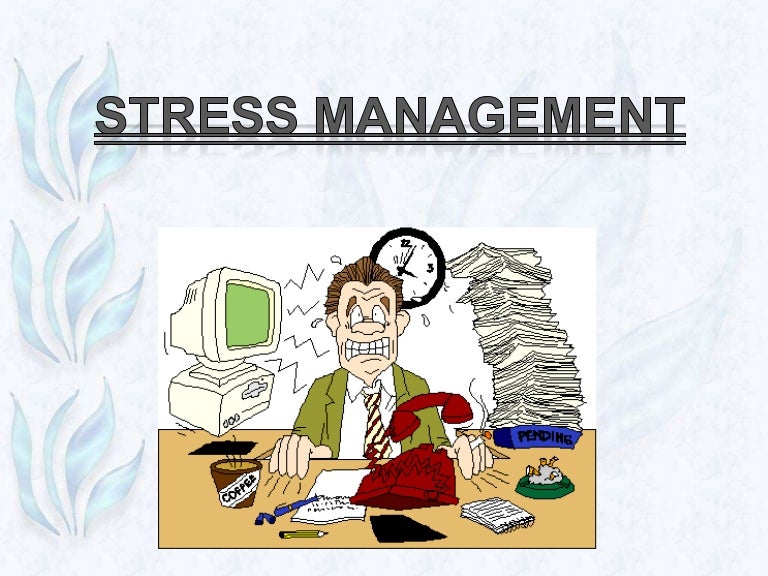 As everybody knows, the state of one’s body impacts the mind, and vice-versa. Deliberately relaxing the body is an excellent antidote to the stress response. Yoga, gentle stretching, massage or other forms of bodywork can be quite helpful with decreasing tension. And, they’re fun!
As everybody knows, the state of one’s body impacts the mind, and vice-versa. Deliberately relaxing the body is an excellent antidote to the stress response. Yoga, gentle stretching, massage or other forms of bodywork can be quite helpful with decreasing tension. And, they’re fun!
Reminder: practice, you’re worth it!
As noted previously, try these methods on for size, to see what works best for you. Don’t necessarily expect a quick fix, but trust in the fact that putting effort in these areas will lead to good things in the stress management realm. Remember: you are worth taking care of, so take your health and wellbeing seriously.
7 ways to manage stress - Lifehacker
August 18, 2016 Adviсe
Nervous tension reduces productivity, spoils mood, causes significant damage to health. Fortunately, stress can be resisted. You just need to follow a few simple rules.
We all know that strong experiences have serious emotional and even physical consequences. So why are they so difficult to manage?
So why are they so difficult to manage?
Researchers from Yale University (USA) know the answer. They found that stress reduces the volume of gray matter in areas of the brain that are responsible for self-control.
Thus, each emotional shock, by suppressing the ability to control stress, exacerbates subsequent shocks. It turns out a kind of vicious circle.
But don't lose heart. You can reverse this effect and manage stress if you make this a priority. The sooner you move into effective emotional management, the easier it will be to avoid harm from stress later on.
The best weapon against stress is the ability to choose one thought over another.
William James
American psychologist
Fortunately, the plasticity of the brain allows it to rewire and repair damaged areas as we change behavior. That is, by properly relieving stress, we train the brain to more effectively resist stress.
These seven strategies will help you restore your brain and manage stress.
1. Learn to say "no"
Saying "no" is a big challenge for many people. But there is no need to be afraid of this word. If you have to say no, avoid saying "I don't think I can" or "I'm not sure." By saying “no” to new responsibilities, you honor those you have already taken on and help yourself to successfully fulfill them.
2. Get out
Technology keeps us connected. Seems like it should be. But enjoying peace in your free time is extremely difficult when at any moment an email can change your train of thought.
Regular shutdowns help control stress levels and rest. Being in the access zone around the clock, you are only being exposed to an inexhaustible stream of stress factors. But if you force yourself to go offline or even turn off your phone, you will allow your head and body to relax.
Various studies show that even if you don't check your e-mail on the weekends, it can help reduce stress.
If you can't ignore work contacts on weekday evenings, how about weekends? Pick the right time and keep yourself busy. By incorporating these mental exercises into your weekly schedule, you'll be surprised how refreshing and stress-relieving these breaks are.
By incorporating these mental exercises into your weekly schedule, you'll be surprised how refreshing and stress-relieving these breaks are.
If you are worried about negative consequences, try to start by only disconnecting when you are least likely to be contacted. For example, on Sunday morning. As you get used to these measures, gradually increase the amount of time you spend away from technology.
3. Neutralize unfriendly people
Unpleasant people are frustrating, tiring and stressful. You can manage your interactions with them by controlling your feelings. When you have to deal with such a person, approach the situation wisely. Guard your emotions and don't let anger or frustration wreak havoc.
At the same time, consider the point of view and motives of the disagreeable person to find a way to reach consensus. Even when everything goes downhill, you can endure such a person without letting him piss you off.
4. Don't hold grudges
They also cause stress.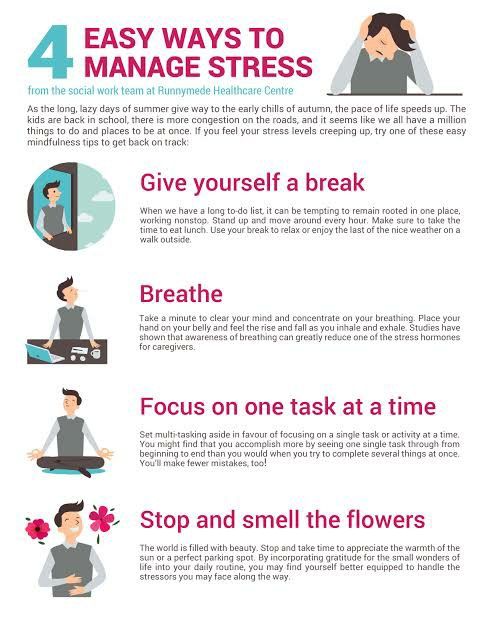 Simply by remembering the cause for resentment, you put the body into "fight or flight" mode - a survival mechanism that prepares the body to fight or flee from a threat. When danger is in front of you, this reaction is life saving. But if the threat has long passed, then the stress supported by memories only damages the body and can have a devastating effect.
Simply by remembering the cause for resentment, you put the body into "fight or flight" mode - a survival mechanism that prepares the body to fight or flee from a threat. When danger is in front of you, this reaction is life saving. But if the threat has long passed, then the stress supported by memories only damages the body and can have a devastating effect.
Researchers from Emory University (USA) have proven that prolonged emotional stress increases blood pressure and contributes to the development of heart disease. By holding on to resentment, you accumulate stress. People with high emotional intelligence avoid this state at all costs. By letting go of resentment, you will not only feel better, but also improve your health.
5. Practice Meditation
Mindfulness is a simple, research-backed form of meditation that helps you master unruly thoughts and actions. People who practice it concentrate better even when not meditating. This technique is great for dealing with stress, as it suppresses feelings of out of control.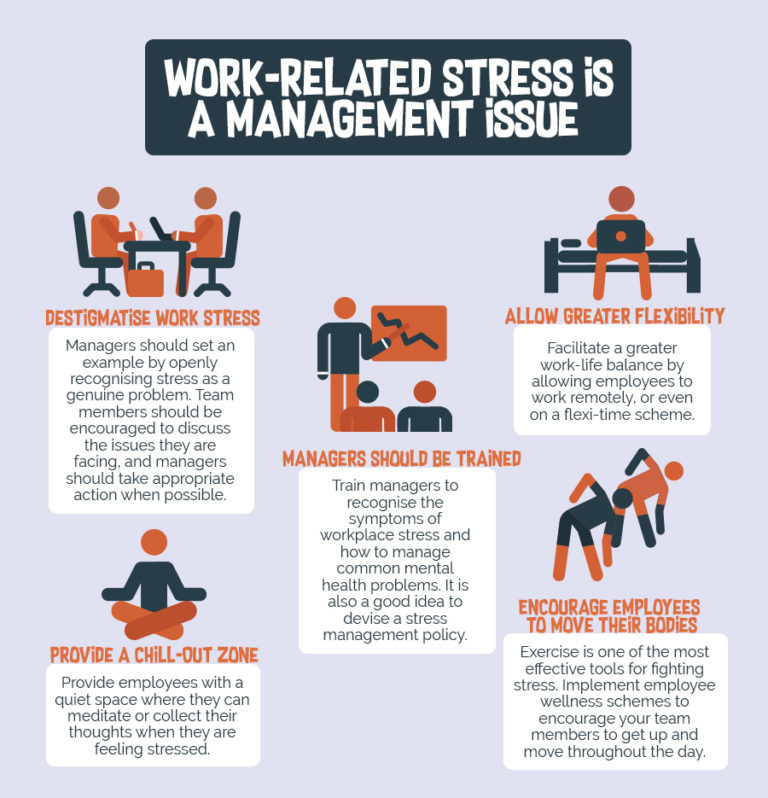
Self-awareness prevents spontaneous switching between thoughts, which helps to refrain from negative reasoning. It's a good way to get through the day at work while staying calm and productive.
6. Look at things in perspective
The reason for our worries often lies in a distorted perception of events. Before you waste a lot of time going through your boss's instructions from the last planning meeting, take a minute to see the whole picture. You can resort to this method when the level of anxiety does not correspond to the real reasons for it.
If you catch yourself thinking superficially, then try to rethink the situation. The best way to get rid of this train of thought is to list the things that really went wrong. Most likely, you will count one or two points and not bury the whole idea.
To remain calm, it is important to understand that sensations often distort the situation, and the scale of the problem may not be as significant as it seems.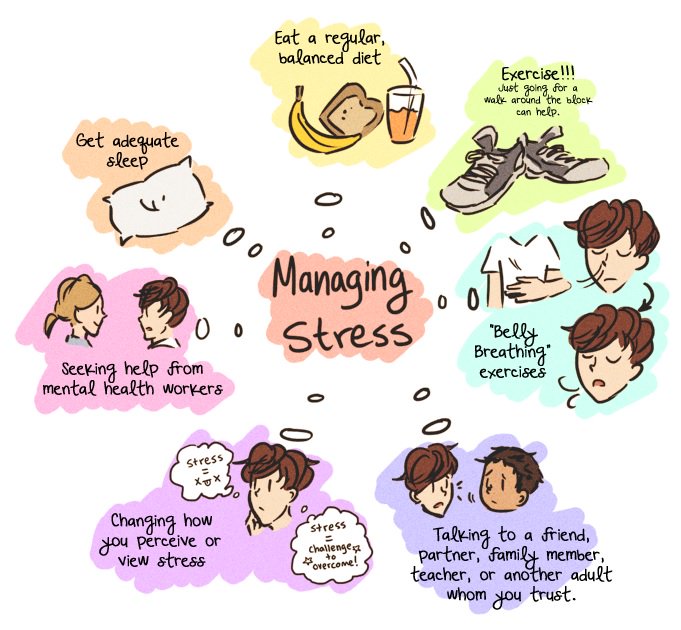
7. Use your support system
Trying to do everything yourself is tempting but ineffective. To stay calm and productive, you need to acknowledge your weaknesses and ask for help when you need it. In other words, if the situation becomes too complicated, the support system should be activated.
Everyone in life has people who are ready to cover and support at a difficult moment. Find such people in your environment and turn to them for advice or help when needed.
Just talking about your worries can reduce your anxiety and change your outlook on the situation. In most cases, other people see the solution that you don't, because their perception of the problem is free from unnecessary emotions. Asking for help will reduce anxiety and strengthen relationships with those you rely on.
The strategies listed may seem simple. But when stress clouds your mind, they can be difficult to apply. Get over yourself when your head is spinning with excitement, and you reap the rewards of disciplined stress management.
Modern Stress Management
The Advanced Stress Management Program consists of two modules: Individual Stress Management Skills and Organizational Stress Management.
The first module will consider the main individual factors in the occurrence of negative functional states: non-adaptive motivational structure and attitudes that prevent effective activity in a stressful situation, lack of effective proactive coping strategies, irrational distribution of resources. Next, individual techniques will be considered that reduce the influence of negative factors of performance in a stressful situation. The last stage of work in the first block will be the analysis of effective ways of behavior in a stressful situation, the search for individual and social resources for coping with the negative manifestations of stress. The result of the work within the first block will be the development of an individual strategy (in the form of a cognitive map) to increase efficiency in a stressful situation.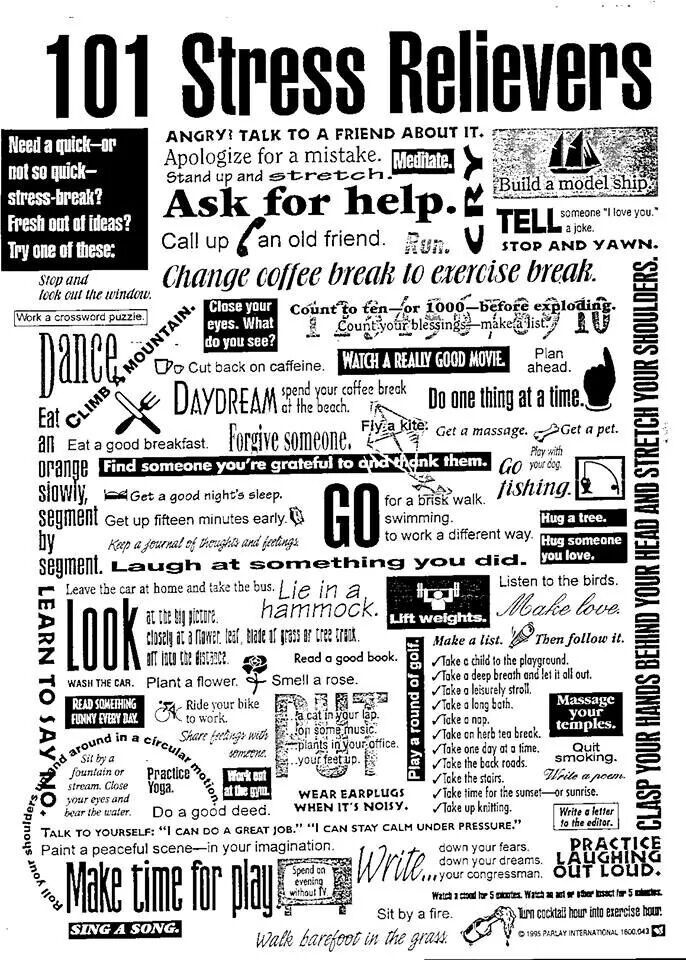
The second module will review the main approaches to managing stress in organizations. The main focus will be on the analysis of organizational factors that enhance and weaken the destructive impact of stress on the efficiency of the organization, the characteristics of managerial interventions on the social environment of the organization in order to prevent negative socio-psychological manifestations of group stress.
Who is the program for?
The target audience of the program is senior and middle managers, specialists involved in negotiations, including international ones. heads and managers of organizations, employees of HR departments, organizational psychologists, social work specialists.
How does the training work?
The program takes place online on weekday evenings and on Saturdays in an intensive format for a comfortable combination of study and work.
What will I learn from the program?
The program will allow you to master the following competencies:
- Knowledge of the main factors that aggravate the impact of stress at work, basic approaches to correcting negative functional states, how to prevent negative functional states in a team;
- Ability to analyze individual factors causing stress, plan organizational measures to prevent stress among employees and evaluate their effectiveness;
- Possession of basic techniques of self-regulation based on the reflection of typical individual manifestations of stress, techniques for collecting and analyzing data on stress factors in the organizational environment.


